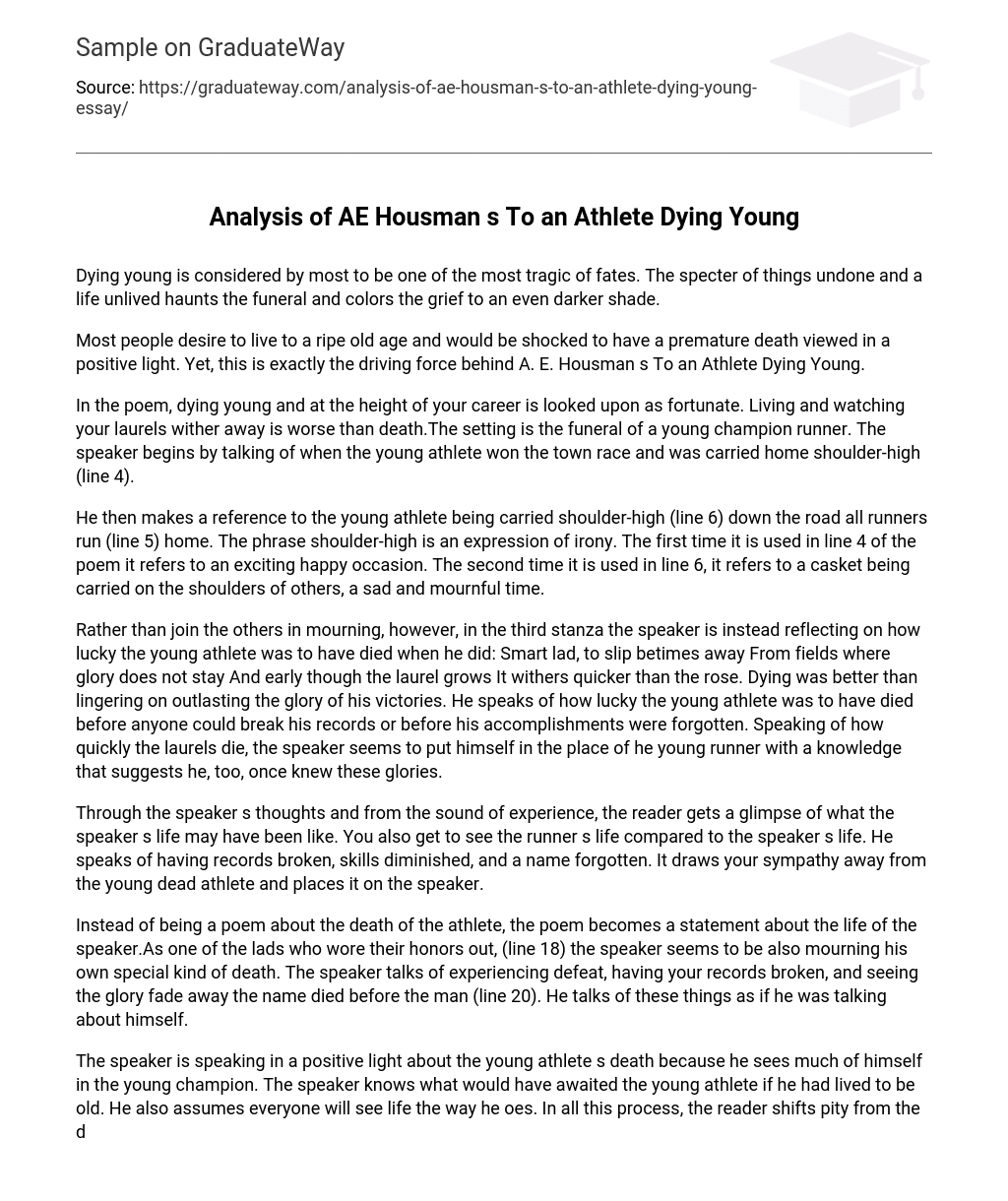Many believe that dying at a young age is one of the most tragic fates one can experience. The funeral is haunted by the unfulfilled potential and un-lived life, which intensifies the grief to an even deeper level.
A. E. Housman’s poem “To an Athlete Dying Young” explores the concept that although most people hope to live a long life, the premature death of an athlete can be seen as a positive event.
In the poem, it is considered fortunate to die young and at the peak of one’s career. It is seen as worse to live and witness one’s accomplishments fade away. The poem takes place at the funeral of a young champion runner. The speaker starts by mentioning the time when the young athlete won the race in town and was celebrated by being carried home on people’s shoulders (line 4).
He then refers to the young athlete being carried shoulder-high down the road all runners run home. The phrase shoulder-high is used ironically. In line 4 of the poem, it signifies a joyful event. However, in line 6, it denotes a somber occasion where a casket is carried on the shoulders of others.
Instead of joining in mourning with others, the speaker in the third stanza reflects on the fortunate timing of the young athlete’s death. “Smart lad,” he says, “to slip betimes away from fields where glory does not stay.” The speaker acknowledges that early on in life, one may achieve great fame, symbolized by the quick growth of laurels. However, this fame fades even faster than the rose. The speaker suggests that dying was a better fate for the athlete than living past the peak of his glory. He emphasizes the luckiness of the young athlete to have died before his records were broken or his accomplishments were forgotten. By describing how quickly laurels wither, the speaker implies that he himself once experienced similar glories and now empathizes with the young runner.
Through the speaker’s thoughts and the sound of experience, the reader gains insight into the potential life of the speaker. The text also compares the runner’s life to that of the speaker, highlighting records being broken, skills fading, and a forgotten name. This shift in focus directs sympathy away from the deceased young athlete and toward the speaker.
Instead of focusing on the athlete’s demise, the poem explores the speaker’s own existence. Being one of the lads who have worn their achievements proudly (line 18), the speaker appears to also lament their personal form of demise. They discuss undergoing defeat, witnessing their accomplishments surpassed, and observing the vanishing splendor as their reputation fades away – the name dying before the person (line 20). The speaker discusses these aspects as if they were describing their own journey.
The speaker reflects positively on the death of the young athlete, as he sees similarities between himself and the talented champion. The speaker is aware of the challenges that the young athlete would have faced in old age. Additionally, the speaker assumes that everyone shares his perspective on life. Throughout this contemplation, the reader’s compassion shifts from the deceased to the living, grieving not for what never happened, but for what was accomplished and then lost.
Housman’s poem “To an Athlete Dying Young” implies that both life and glory are fleeting. One possible solution is to accomplish something remarkable and then quietly pass away, avoiding the decline of fame and the surpassing of records. Recognitions have a limited lifespan and achievements are swiftly surpassed, leaving departure as the sole option before honors fade and accomplishments are exceeded.
Housman, A. E.’s “To an Athlete Dying Young” is discussed in An Introduction to Literature.





